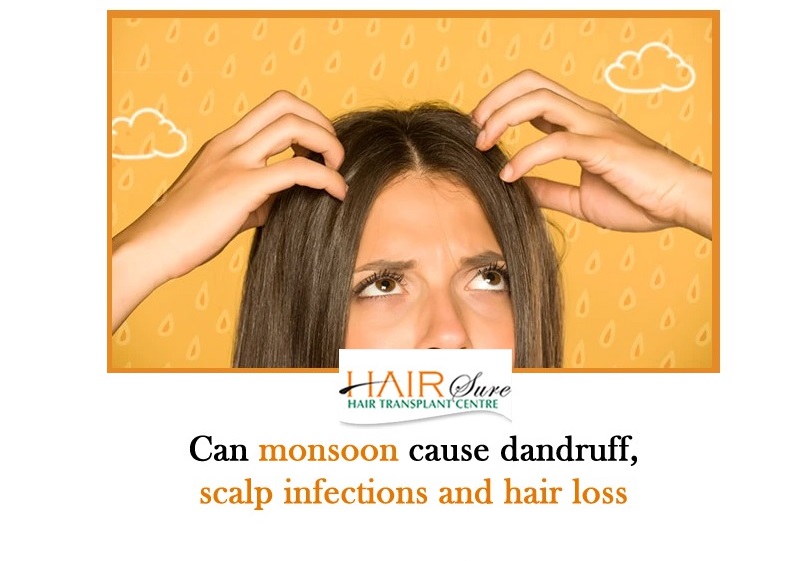
Blog Details
Can monsoon cause dandruff, scalp infections and hair loss

The monsoon brings lots of relief from the hot summer to everyone. Monsoon is also known for its seasonal diseases, fungal infections, and viral fevers. Another less-known impact of monsoons is on hair. Due to the high humidity in the air, hair becomes sticky and greasy. The scalp becomes a breeding place for dandruff-causing infections. The scalp becomes oily resulting in hair fall and other infections.
Why does one get dandruff?
Dandruff is a common condition that causes the scalp’s skin to flake. Dandruff occurs when infected by a fungus called Malassezia. Though dandruff is not a frightful infection, it mainly causes itching and scalp scaling. If timely care is not taken, it leads to severe hair fall. Initially, dandruff can be treated with a gentle and mild shampoo. If the symptoms persist, medical assistance is compulsory. If you are already suffering from dandruff, frequent washing of hair worsens the condition as the skin becomes dry over the body, including the skin on the scalp. So especially during monsoon season, it is better to use a medicated shampoo.
- Sebaceous glands secrete sebum, which lubricates the hair and skin. The excessive production of sebum can lead to dandruff.
- Due to hormonal imbalance, the amount of sebum on the scalp increases, which is another cause of dandruff.
- When a person is under stress, hormonal changes contribute to dandruff.
- Dandruff flares up with the excessive use of gel and sprays for hairstyling. This aggravates the scalp and increases dandruff.
- Climatic conditions also play a key role in fungal infections, and dandruff is the most common infection.
- The polluted air consists of dirt accumulated in the hair, causing irritation to the scalp and developing dandruff as the pores get blocked.
- Wearing a hat creates a warm atmosphere on the scalp, which is most suitable for developing dandruff.
Precautions to control dandruff
- As dandruff is contagious, avoid sharing combs and pillows.
- Regular head washes with anti-dandruff shampoo, especially during monsoon season.
- When you have a dandruff problem visiting sunny areas like beaches, little sun exposure helps reduce dandruff.
- Home remedies include aloe vera gel, hot coconut oil, and neem leave massage.
Scalp infections during monsoons
Though monsoon season looks pleasant, fresh and greenery everywhere, it brings many infections, especially scalp infections. The scalp gets infected if fungus or bacteria enter the scalp through hair follicles and damage the skin. Scalp infections can lead to various scalp skin rashes, including hair loss. Common scalp infections are:-
Ringworm: No worm is involved in this scalp infection. It’s contagious and most common in school-going children. It spreads from person to person, animal to person, or even object to person. It’s a fungal scalp infection, causing itchy, scaly bald patches on the head, ring-shaped rash, red, scaly, cracked skin, and hair loss. Ringworm got its name because of its circular appearance.
Precautions: You must wash your hands whenever you touch any body part during a ringworm infection. It helps from the spreading of the infection to other areas. After showering, the infected area should be dried, especially with a clean and dry towel. The infected areas should always be kept clean and dry.
Causes for hair loss during monsoons
In monsoon, one faces hair loss due to high humidity. People also face monsoon hair loss due to infections of the scalp. If one contracts flu or viral fevers, they also lead to hair loss. Apart from this, general reasons for hair loss are :
- Family history
- Hormonal imbalance
- Thyroid problem
- Medical conditions
- Hairstyles and treatments
- Stress
- Protein deficiency
How to prevent monsoon hair loss?
- Make sure that you are oiling the scalp regularly.
- Do not immediately rub the hair roughly if you get wet in the rain. This will lead to hair breaks.
- Cover your hair along with your body while going out in the rain.
- If it is windy, please tie your hair loosely, so it does not get too tangled. Tangled hair is prone to breakage.
- If you are sick and in bed, comb your hair at least once daily. If you leave it without combing, you will see a lot of hair fall after 2-3 days when you are combing.